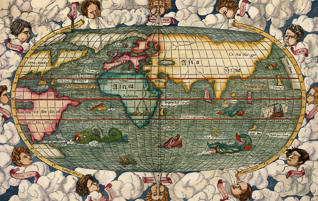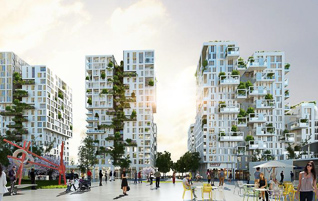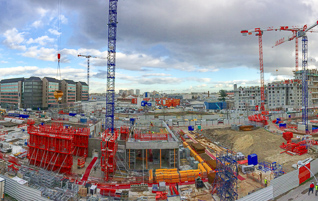Scientific programs
All recent scientific programs involving several laboratory members are presented on this page.
To sort scientific programs by team, click on the desired UMR team.
Sustainability of renewable energies
Dates: 2023 - 2025
The project aims at assessing the sustainability of electric renewable energy along the value chains, the concept of sustainability being understood in its social and environmental sense.
The territorial dimension of health crisis – DITES
Dates: 2022 - 2024
DITES project's objective is to reassess and propose methods of cooperation between the territorial levels in order to define modes of governance that would allow us to anticipate and adapt to different crises.
SPACE
Dates: 2022 - 2025
The SPACE project aims to develop a dynamic, adaptive approach to urban sustainability. The project draws upon analyses of the risk factors and sociospatial patterns that drive dengue transmission in Singapore, as well as the social and technical skills developed by individuals, community groups and state actors in response to disease propagation.
LAPTER
Dates: 2022 - 2025
The research project LAPTER (Heritage and Tourism Labels in the Centre Val de Loire Region: a TERrritorial resource?) aims to answer the following question: what is the purpose of labels for heritage and tourism development? More precisely, it will look at whether - and to what extent - these labels are tools for territorial planning and local development.
From the World Before to the World After – MAMA
Dates: 2021-2024
Contribution of Géographie-cités to the project "Du Monde d'Avant au Monde d'Après" (MAMA), a multidimensional survey on the adjustments, dynamics and reorganizations caused by the Covid pandemic19.
LimSpaces – Living with uncertainty. Strategies of adaptation and horizons of expectations in Ukraine and Moldova
Dates: 2021 - 2024
The project offers a new interpretation of the societies of Ukraine and Moldova. The originality of the project lies in looking at the microsocial effects of the "in-between" position of these populations, caught between Western and Russian spheres of intervention. It analyzes them from an actor-centered, grounded and relational perspective.
Emmanuel de Martonne Corpus. Phase 2
Dates: 2021 - 2022
Phase 2 of the project, within the framework of Digital Humanities, promotes a second body of archives by geographer Emmanuel de Martonne (1873-1955) consisting of 6 field notebooks and 400 glass plates. As for phase 1, phase 2 analyzes, documents, archives and disseminates the archives according to a threefold problematic: that of the geographical heritage of textual and iconographic sources, that of Open Science and that of innovation in Human and Social Sciences.
DESIGNSHS. Graphic Design, Research, and Social Science Heritage
Dates: 2021 - 2025
The program aims to study and valorize the archives of the laboratory of cartography, then of graphics, directed by Jacques Bertin from 1954 to 1985 (EPHE then EHESS). The aim is to explore, from this major source, the relationships that were established between graphic creation and research in the human and social sciences in the second half of the 20th century.
Social housing sales in the Paris region: Social housing organizations & their tenants facing the Parisian housing market
Dates: 2020 - 2023
In France, social housing sales have been promoted by public officials since the 1980s in order to improve households’ housing trajectories and to contribute to the financing of new social dwellings. The project analyzes the housing past and futures of households living in social buildings offered for sale and assesses the way sales changes social housing management and production.
Land conversion for urban uses in the global south
Dates: 2020 - 2021
This collective research focuses on the modalities of land use conversion in the Global South in relation to urbanization. The aim is, on the one hand, to identify and classify the conversion processes, the exits from agricultural use or the entry into the urban market on a macro scale and, on the other hand, to document the modalities of action and their effects on the basis of specific case studies.
DiffusEsperanto – Documenting the multilingual dissemination of a universalist project at the end of the 19th century: the digitization of the early writings of the Esperanto movement (1887-1892)
Dates: 2020 - 2021
As soon as Esperanto appeared in 1887, its promoters developed a multilingual propaganda to popularize this "international language". The project is to digitize the booklets published in several "natural languages" between 1887 and 1892 to promote Esperanto, documents scattered in European and Israeli libraries, and thus constitute a corpus for the analysis of the early diffusion of the Esperanto idea.
A sky still divided? Germany’s East and West, thirty years after reunification
Dates: 2020 - 2021
The project questions the observable differences between East and West German societies 30 years after reunification. It is based on ethnographic surveys conducted by Franco-German teams, returning to the thesis work of two anthro-pologists who had studied in the 1990s villages located in direct proximity to the former Iron Curtain.
MobiTIC
Dates: 2020 - 2024
MobiTIC is a collaborative research program that gathers public research institutions (CNRS, IFSTTAR), the national statistics bureau (INSEE) and the main mobile network operator in France (Orange). We aim to develop a reproductible methodology to produce representative indicators of people presence and mobility, frequently updated and at very fine spatial and temporal scales.
Cartography of the exile in the Stalinist USSR
Dates: 2020 - 2021
The project is working on a cartographic representation of deportation trajectories and "special colonies" where, during the time of the USSR, entire population groups (about 6 million people) were relegated. A feasibility study is being carried out here for three control territories with a view to a generalisable approach for the whole of the USSR.
RECORDS
Dates: 2020 - 2024
Through this project we aim to better understand the diversity of individuals musical taste, listening practices and effective music consumptions on streaming platforms. We develop indicators measuring the effects of recommendation (human and machine) on the listening history of users. To fulfill these objectives we combine traditional survey methods with big data analysis. The program is based upon a partnership between social scientists, computer scientists and one of the major music streaming platforms in France.
ANR-DFG Imageun – In the Mirror of the European Neighbourhood (Policy). Mapping Macro-Regional Imaginations (2020-2024)
Dates: 2020 - 2024
The aim of this Franco-German research project is to analyse the specifically geographical dimension of the imaginaries that animate regional integration in this part of the world, by crossing the analysis of textual and iconographic corpuses, in order to identify and study the regions of the world to which the populations of five countries occupying different situations in the region feel they belong: Germany and France, Turkey, Tunisia and the United Kingdom.
Circulation, geopolitics and the construction of knowledge about the world from the straits. The case of a world passage, the Strait of Magellan
Dates : 2020 - 2022
The project analyses the role of straits in the organization of political spaces on a global and regional scale in the modern period, and in particular examines the role of the Strait of Magellan in the processes of circulation of knowledge and narratives that linked Europe to the American continent. Other straits are studied in a comparative way (Gibraltar, Bosphorus, Malacca).
Financing Clean Air
Dates: 2019 - 2023
The Financing Clean Air project brings together researchers from Europe and China to explore how Land Value Capture (LVC) might be used to support the goal of improving air quality in urban environments. The project takes a specific focus on the impacts that transport and housing, particularly domestic heating, have on air quality.
Governing Diverse Cities in Europe and Asia
Dates: 2019 - 2021
Cities in Europe and Asia have become the focal points of changing migration patterns. This context has challenged pre-existing models of management of urban diversity. In parallel, the rise of nationalist rhetoric feed the implementation of a number of exclusionary measures. This comparative projects contemplates the city as a key site to on emerging models of diversity governance.
MOREHOUSE (Modeling hOusing maRkets dynamics thanks to Emerging and HeterOgeneoUs data SourcEs)
Dates: 2019 - 2021
In this exploratory program in partnership with IFISC (Palma, ES) we uncover the structure of real estate agent networks that can be identified from ad data posted on platforms (SeLoger, LeBonCoin, Idealista, FotoCasa). The data are represented using bipartite networks linking agents and ads. The methods used are those of spatial networks science and community detection in ecological networks.
PaMIzMex When migrants in transit produce the city. Crossed views between Paris, Milan, Izmir and Mexico City
Dates: 2019 - 2021
To specify the power relationships at work in the deployment of migrant spatialities. To characterize the forms of presence/visibility of migrants in transit in the city in a relational approach to public spaces. Study the daily interactions with other urban actors, inhabitants, tourists, institutional actors. Overcoming dualisms by articulating the times of mobility and anchorage.
CybergeoNet
Dates: 2020 - 2021
Starting from the specialized vocabulary of geography, the project aims to develop a protocol adaptable to other disciplines in the humanities and social sciences. The aim is to systematize experimented actions in terms of translation, to promote the translation of metadata (English, Spanish, Chinese), to develop multilingual indexes that will be shared with other open access journals.
POPSU Lille – The Lille metropolis and the others: cooperation for innovation?
Dates: 2019 - 2022
The project aims at analysing the way metropolises – and in particular the Métropole européenne de Lille – are embedded in complex territorial systems, made of other cities, rural areas, in and outside France. It is based on the characterization of the relationships between the metropolis and other territorial entities close to or far from it. It addresses urban metabolism in its extraterritorial dimensions.
The land development and property activities of transport infrastructure managers: issues, processes and outcomes on urban production in Paris city-region
Dates: 2019 - 2022
The Firminfra project studies the land and real estate activities of two transport operators (Paris Aéroport and Société du Grand Paris) and the role of these actors in urban production in Île-de-France. The research describes the progressive diversification and evolution of the land and real estate activities of the two operators, analyses the logic underlying these changes and explores the outcomes of their activities on urban transformations of Paris city-region.
NETCONF “Scientific Networks and Congresses”. Understanding the effect of congresses on the dynamics of scientific networks
Dates: 2019 - 2021
The aim of this project is to characterise the effect that congresses can have on the dynamics of scientific networks and their internationalisation. To improve understanding of the social depth of scientific activity and the role of congresses in the circulation of knowledge and collaboration, NETCONF proposes to compare the case of two congresses in two disciplines: chemistry and political science.
NETSCITY “Analysing and visualising interurban scientific networks”
Dates: 2019 - 2021
This project aims to develop a platform for geospatial exploration of science data. The objective is to make available through an open access platform different options for processing and visualizing spatialized networks of contemporary science.
WIsDHoM – Wealth Inequalities and the Dynamics of Housing Market. Interpreting real-estate market-based regime of spatial inequalities
Dates: 2019 - 2022
The project investigates how asset-based welfare policies, residential market volatility, stratified accumulation and vulnerability impinge upon the geography of inequality in property markets. Since the 1990s, housing prices have increased faster than the income of buyers, becoming a driver of social polarisation and household vulnerability. We investigate links bteween socio-spatial inequality, asset capitalisation, instability and vulnerability in residential housing markets.
Inter-Friches – International and interdisciplinary workshops on urban wastelands
Dates: 2019 - 2021
Urban vacant lots, or wastelands, defined as transient spaces omnipresent in the city, became over the years a novel object of study in many disciplines (urban planning, geography, sociology, ecology). The workshops that we propose aim to define an interdisciplinary methodology to characterize wastelands’ in a systematic and transdisciplinary way.
Ties and interactions between the Condorcet university campus and the local community
Dates: 2019 - ...
This research intends to question the local impacts of university campus' construction by analyzing the case of Campus Condorcet. We aim to better comprehend how local stakeholders perceive, promote or contest present and future urban transformations. This project is based on a collective research with students of EHESS from different disciplines.
Com2SiCa research program (Understanding and Simulation of Human Behaviors in areas affected by disasters: from analysis to policy making)
Dates: 2018 - 2021
The Com2SiCa research program (Understanding and Simulation of Human Behaviors in areas affected by disasters: from analysis to policy making) aims to improve understanding and the ability to anticipate individual and collective human be-havior in face of complex threats and disasters of all origins, breaking down traditional disciplinary approaches.
Encyclopedia of Sciences Geography-Demography field
Dates: 2018 - 2025
Conception and writing of about 80 books presenting the knowledge and know-how of geography and demography for students and researchers (master and doctorate level) as well as for the general public. The books will be published in French by ISTE and in English by Wiley.
POPSU program – Rouen Normandy
Dates: 2018 - 2021
The "POPSU - Rouen" program is a collective research project involving public policy stakeholders and research teams. The scientific project focuses on three issues: metropolitan cooperation, accessibility and mobility, and metropolitan agenda for ecological transition. The research of the UMR Géographie-cités focuses more specifically on the analysis of the trajectory of public policies in the field of metropolitan cooperations and in the field of mobility.
The world seen from Kazakhstan ; exploration of world representation from an in-between space
Dates: 2018 - 2020
A previous survey (EuroBroadMap, 2009-11) concluded that Central asia was a blind sport in mental representation of world regions. This result could be explained by a methodological bias: the drawn regions are centered on the respondents, yet no survey had been carried out in Central Asia. To answer this question, the survey was replicated in 2018-19 in Kazakhstan.
Mobiliscope – Cities around the clock
Dates: 2017 - 2025
Places are not the same at night and during the day : people move daily and make changes in neighbourhoods densities and their social structures. Mobiliscope is a geovisualization platform to explore how areas and segregation change over a 24 hour period.
H2020 Odycceus (Opinion Dynamics and Cultural Conflict in European Space)
Dates: 2017 - 2020
Oddyceus seeks conceptual breakthroughs in Global Systems Science, including a fine-grained representation of cultural conflicts based on conceptual spaces and text analysis, game theory, and new models of alignment and polarization dynamics. It develops an open modular platform, PENELOPE, that integrates tools, from data scraped from social media and digital sources, to visualisation of the analyses and models.
Land-based commons for housing in the Global South
Dates: 2017 - 2020
To what extent can the “commons” approach contribute to the renewal of housing policies and programs? What is the feedback from the field of collective, cooperative, or commoning housing projects in Global South's cities?
Based on the notion of “commons”, this research scrutinizes forms of land tenure that are alternative to private ownership and guarantee land security in precarious neighborhoods.
Metropolises – Crisis and mutations in the Euro-Mediterranean space
Dates: 2017 - 2021
The program, led by the Ecole française of Rome (EFR) in collaboration with the Ecole française of Athens (EFA) and (until 2019) the Casa Velazquez (Madrid), questions the effect of the 2008 subprime crisis and the austerity policies on the Euro-Mediterranean in a trans-scalar perspective, based upon disciplines concerned with territorial issues (geography, planning, sociology, etc.). It is based on scientific meetings, doctoral training workshops, and publications.
Emmanuel de Martonne Corpus. Phase 1
Dates: 2017 - 2020
This project promotes the archives of the French geographer E. de Martonne (1873-1955) within the framework of Digital Humanities. The corpus of 7 field notebooks and 800 glass plates is analyzed, documented, archived and disseminated according to a threefold problematic: that of the geographical heritage of textual and iconographic sources, that of Open Science and that of innovation in Human and social Sciences.
RelatHealth- A relational approach to place effects on health in cities
Dates: 2018 - 2021
In RelatHealth project we propose to analyse place effects on health focusing on accessibility to various urban resources, such as health care facilities but also commercial, cultural, transportation and leisure facilities. We aim to reconsider the notion of accessibility combining not only spatial distribution of urban resources but also people’s place experiences and to explore inequalities in resources accessibility may translate into inequalities in health. Two cities are more specifically studied : Paris and Montreal.
HANC – Healthy Aging and Networks in Cities: The combined role of built environments and socio-spatial networks
Dates: 2016 - 2021
The HANC project aims to examine well-being and health status of older adults in relation to urban environments, mobility behaviours and social network.
EIGHTIES
Dates: 2016 - ...
Interdisciplinary and international team of researchers created by Thomas Louail in 2015 and founded by the RNSC (national network for complex systems) and the LabEx DynamiTe. The team aims to address quantitative geography issues and theories with massive observational and simulated data.
JournalBase
Dates: 2010 - 2023
JournalBase provides a unique service for identifying national and international non-predatory journals in the social sciences and humanities and for comparing their listings in national and international databases. JB is developed in partnership with the INSHS of the CNRS, the UMR-Géographie-cités and with the support of the TGIR Huma-Num for hosting.


 CRIA
CRIA EHGO
EHGO PARIS
PARIS









































